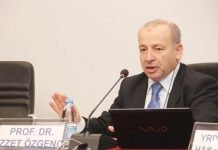The Turkish government detained seven people on Saturday during raids on 26 locations in 10 provinces across Turkey as part of its massive post-coup witch hunt targeting alleged members of the Gülen movement.
The detentions were made after the İstanbul Chief Public Prosecutor’s Office issued detention warrants for 26 people over their alleged use of the ByLock mobile phone messaging application. It was reported that four of those being sought are currently abroad.
Turkish authorities believe ByLock is a communication tool among alleged followers of the Gülen movement. Tens of thousands of people, including civil servants, police officers, soldiers, businessmen, and even housewives have either been dismissed or arrested for allegedly using ByLock since a controversial coup attempt on July 15, 2016.
The UN Human Rights Council’s Working Group on Arbitrary Detention (UN/WGAD) stated in a recently released assessment that detention, arrest and conviction in Turkey based on the alleged use of ByLock is a violation of Articles 19, 21 and 22 of the International Covenant on Civil and Political Rights (ICCPR).
UN/WGAD examined an application submitted by the lawyers for Mestan Yayman (51) and released its opinion on the case. Yayman, who used to be vice governor of Antalya province, was suspended on August 29, 2016 and was subsequently dismissed from his job under Statutory Decree No. 672, issued on September 1, 2016, under which about 50,000 people were dismissed.
Hundreds of thousands of people in Turkey have been the subject of legal proceedings in the last two years on charges of membership in the Gülen movement since a coup attempt on July 15, 2016, a Turkish Justice Ministry official told a symposium on July 19, 2018.
“Legal proceedings have been carried out against 445,000 members of this organization,” Turkey’s pro-government Islamist news agency İLKHA quoted Turkish Justice Ministry Deputy Undersecretary Ömer Faruk Aydıner as saying.
Turkey survived a controversial military coup attempt on July 15, 2016, that killed 249 people. Immediately after the putsch, the Justice and Development Party (AKP) government along with President Recep Tayyip Erdoğan pinned the blame on the Gülen movement.
Fethullah Gülen, who inspired the movement, strongly denied having any role in the failed coup and called for an international investigation into it, but President Erdoğan — calling the coup attempt “a gift from God” — and the government initiated a widespread purge aimed at cleansing sympathizers of the movement from within state institutions, dehumanizing its popular figures and putting them in custody.
Turkey has suspended or dismissed about 170,000 judges, teachers, police and civil servants since July 15, 2016. On December 13, 2017, the Justice Ministry announced that 169,013 people have been the subject of legal proceedings on coup charges since the failed coup.
Turkish Interior Minister Süleyman Soylu announced on April 18, 2018, that the Turkish government had jailed 77,081 people between July 15, 2016, and April 11, 2018, over alleged links to the Gülen movement.















